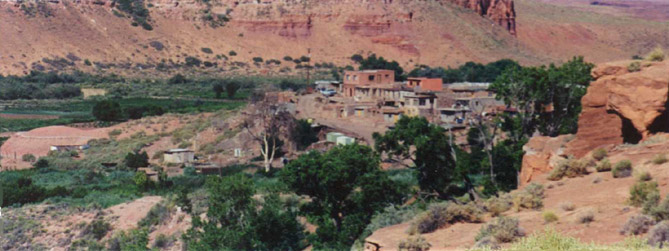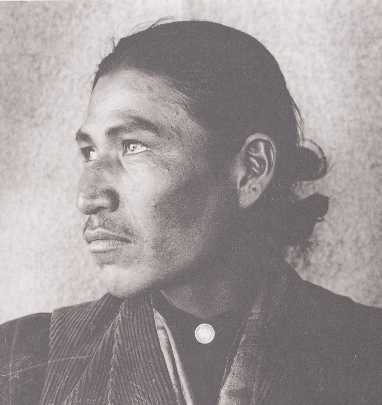 Another Stereotype of the Month entry:
Another Stereotype of the Month entry:
 Another Stereotype of the Month entry:
Another Stereotype of the Month entry:
The source article
June 13, 2002
How Obfuscation Is Emerging as a Technology That Is Critical to .NET, Yet Somehow Not Owned by Microsoft
By Robert X. Cringely
Years ago, I was flying a small airplane that I had built myself and the engine stopped in flight. Despite the picture portrayed in most news accounts of small aircraft engines failing and planes dropping from the sky like plump raindrops, engine failure is actually quite rare. But it happened to me. One moment, I was flying across Arizona, and the next moment, I was gliding across Arizona. I looked down in that first moment of silence and noticed directly beneath me was that giant meteor crater near Winslow — the crater where Jeff Bridges went back to his intergalactic mothership in the movie "Starman." Spectacular as crash landing in that giant crater might have been, I still preferred the idea of a more normal landing in Winslow, which was barely visible on the horizon. As a glider, my plane wasn't really that bad. It was capable of gliding 18 feet forward for every foot of altitude lost, which with luck put Winslow almost within reach. And luck was with me. I caught a couple thermals — rising columns of air — and made Winslow with altitude to spare, landing silently and using my last bit of momentum to roll up in front of the big Native American Air Ambulance hangar just as though I did it every day. I spent most of the next week in that hangar, fixing my plane and learning a little bit about Native American culture.
Winslow sits where it does in northeast Arizona because of the railroad, but it also happens to lie between two giant indian reservations, that of the Hopi and the Navajo. When I was buying a new fuel pump at the local Ford dealer (this was a homebuilt plane, remember), I asked the salesman whether there was any difference selling a car to a Hopi or a Navajo. He said Hopis and Navajos alike bought pickup trucks, not cars, but if there was a difference between the two tribes, it came down to financing: A Hopi always makes his truck payment, while Navajos are somewhat less reliable. "Hopis are pueblo Indians," he explained. "They have lived next door to the same neighbors for a thousand years, so their reputation in the village is very important. Navajos are nomadic plains Indians who don't even think of themselves as having neighbors, so what others think is less important than what they think of themselves. They'll pay when they get around to it."
A colleague comments on the source article
PBS columnist Robert Cringely posted a recent article with an interesting take on community, from the point of view of a car salesman in Arizona:
He said Hopis and Navajos alike bought pickup trucks, not cars, but if there was a difference between the two tribes, it came down to financing: A Hopi always makes his truck payment, while Navajos are somewhat less reliable.
"Hopis are pueblo Indians," he explained. "They have lived next door to the same neighbors for a thousand years, so their reputation in the village is very important. Navajos are nomadic plains Indians who don't even think of themselves as having neighbors, so what others think is less important than what they think of themselves. They'll pay when they get around to it."
If true, this makes bloggers the Hopis of online community. Just take a look at all of the posts about the recent Blogapalooza event: everyone said nice things about each other online. I had a great time too, but what if I didn't? My blog is just one pueblo over... it'd be hard to be totally honest about what I really thought.

Rob's reply to his colleague
You're brave to compare bloggers to Indians with people like me looking over your shoulder. <g>
Actually, I wouldn't make any gross generalizations about Indians if I were you. It's kind of like comparing any two cultural groups—say Jews and Arabs. They're both Semitic and live in close proximity, so the analogy is apt. You wouldn't want to say Jews are more community-spirited than Arabs, would you?
The car dealer's comments may have had a kernel of truth, or they may have been biased. Cringely may have introduced more bias when he reported the car dealer's comments. When you got to them, you were already a couple steps removed from the reality of the situation. That suggests the need for extra caution.
The Navajo were nomadic, and I suppose some still are. They aren't and weren't Plains Indians, except (maybe) long ago. So at least one fact is wrong here.
I don't know how close-knit Navajo communities are, but the Hopi villages are semi-autonomous. There's a lot of factionalism within and between villages. I think the Hopi are more peaceful than most societies overall, but that isn't necessarily true on a house-by-house or village-by-village basis.
I'd say Indian cultures value reputations as much as Western cultures, if not more so. I haven't heard of one Indian culture valuing reputations more than other Indian cultures. The Hopi factionalism suggests they aren't always good neighbors with good reputations.
Besides, if the Navajo are less reliable, it could be for reasons other than a disdain for their reputations. Winslow is closer to Hopi than to most of the Navajo reservation lands, so the Navajo might have to drive farther on average to make payments. The Navajo are more dependent on seasonal jobs like sheep-grazing, so perhaps their incomes are less steady. I probably could come up with other explanations. Accepting the explanation of a white car dealer uncritically is likely to get you in trouble.
Not a big deal, but I try to think about these things. From small details we learn great truths. I'll ask a few other people who know the Hopi and Navajo and see what they think.
Colleague's conclusion doesn't follow
While I'm wearing my critic's hat....
For the sake of argument, let's assume the Hopi are more reliable because they care about their reputations. Because they live and work in close proximity to each other. I don't see how your conclusion follows. Your point about the blog party was that bloggers were extra nice to each other, not extra reliable, because they work together. That the Hopi are more polite to each other doesn't follow from Cringely's car dealer anecdote.
In fact, when I initially read your conclusion, I misread it. I thought you were saying that because the Hopi live in close proximity, they have to be more honest and straightforward with each—which is a kind of reliability. I thought your analogy was that bloggers also have to be more honest and straightforward with each. They have their reputations to protect so they don't BS each other.
Instead your conclusion was the opposite. Bloggers have reputations to protect...so they're extra nice to each other in person? It does not compute.
Like most people, I'm sure, I'm nicer to people in person than I am online. But that's not to strengthen my online reputation. If anything, it's to weaken it. I act nice in person because I don't want people to believe I really mean what I say online.
But I do mean it, of course. So my in-person behavior reduces my reliability by raising doubts about how nasty and opinionated I am online. Essentially, I'm pretending to be nicer than I really am. I'm raising my likability quotient by lowering my honesty quotient.
This behavior is in keeping with what little I've read of small-town behavior. Like bloggers, people in small towns simultaneously value their privacy and gossip about each other. Because there's nowhere to hide, people know each other's faults and secrets. They may be polite because they have to get along, but they're also honest because they have to get along. There's no room for someone who lies to or cheats his fellow citizens. Anyone who violates the common morality is likely to be shamed into compliance or ostracized from the group.
So even if the Hopi anecdote is valid—which I question—it doesn't tell us much about niceness. The anecdote explains why bloggers might be more reliable in person—i.e., as honest as they are online. It doesn't explain why they'd be nicer (i.e., less reliable) in person.
Rob
|
. . . |

|
All material © copyright its original owners, except where noted.
Original text and pictures © copyright 2007 by Robert Schmidt.
Copyrighted material is posted under the Fair Use provision of the Copyright Act,
which allows copying for nonprofit educational uses including criticism and commentary.
Comments sent to the publisher become the property of Blue Corn Comics
and may be used in other postings without permission.